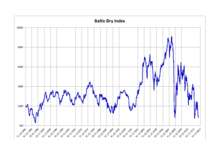Baltic Exchange
The Baltic Exchange (incorporated as The Baltic Exchange Limited[1]) is a membership organisation for the maritime industry, and freight market information provider for the trading and settlement of physical and derivative contracts. It was located at 24–28 St Mary Axe, London, until the building was destroyed by a bomb in 1992, and is now located at 38 St Mary Axe. It has further offices in Europe, across Asia, and in the United States.
 | |
 The Baltic Exchange Memorial Glass, installed at the Baltic Exchange from 1922 to 1992 | |
| Type | Maritime membership and data organisation |
|---|---|
| Location | London, England, UK |
| Founded | 1744 |
| Owner | Singapore Exchange |
| Key people | Denis Petropoulos (Chairman, Baltic Exchange Council) Mark Jackson (CEO) Janet Sykes (CCO) Mark Read (CFO) |
| Currency | GBP |
| Indices | Baltic Dry Index Baltic Panamax Index Baltic Capesize Index Baltic Supramax Index Baltic Handysize Index Baltic Dirty Tanker Index Baltic Clean Tanker Index |
| Website | balticexchange |
Overview

Its international community of 650 member companies encompasses the majority of world shipping interests and commits to a code of business conduct overseen by the Baltic. Baltic Exchange members are responsible for a large proportion of all dry cargo and tanker fixtures as well as the sale and purchase of merchant vessels.
The Baltic Exchange traces its roots back to 1744 and the Virginia and Baltick Coffee House in Threadneedle Street. (English coffeehouses in the 17th and 18th centuries were important places for merchants and captains to exchange news.) It was incorporated as a private limited company with shares owned by its members on 17 January 1900. In November 2016 the Singapore Exchange (SGX) acquired the Baltic Exchange. It remains headquartered in London.
The exchange provides daily freight market prices and maritime shipping cost indices which are used to guide freight traders as to the current level of various global shipping markets as well as being used to set freight contract rates and settle freight futures (known as forward freight agreements or FFAs). Originally operating a trading floor, the exchange's members' transactions are today mainly conducted by telephone.
The exchange is the source of market-wide information and publishes seven daily indices made up from a suite of wet and dry bench-marked time-charter and voyage routes:
- Baltic Dry Index (BDI)
- Baltic Panamax Index (BPI)
- Baltic Capesize Index (BCI)
- Baltic Supramax Index (BSI)
- Baltic Handysize Index (BHSI)
- Baltic Dirty Tanker Index (BDTI)
- Baltic Clean Tanker Index (BCTI)
- Baltic LNG Tanker Index (BLNG)
In April 2018 the Baltic Exchange announced a global container index (FBX)[2] in partnership with Freightos. Liquified Natural Gas (LNG) assessments launched in 2019.[3]
The exchange also provides forward curves, a dry cargo fixture list, sale and purchase values, LPG & LNG assessments, daily market news and the market settlement data for freight derivative contracts.
Current management
As of 2019, the current management includes:
BIFFEX
BIFFEX, the Baltic International Freight Futures Exchange, was a London-based exchange for trading ocean freight futures contracts with settlement based on the Baltic Freight Index. It started trading dry cargo freight futures contracts in 1985, and was modestly successful for some years. All contracts were cleared by the ICCH (International Commodity Clearing House), later renamed LCH.Clearnet (London Clearing House). A tanker freight futures contract was introduced in 1986, but never became popular and was suspended indefinitely the same year. Volumes in the dry cargo contracts dwindled over the years, and the contracts ceased trading due to lack of liquidity in 2001.
Premises
The exchange was located at 24–28 St Mary Axe in the City of London until it was destroyed in a 1992 bomb, and is now located at 38 St Mary Axe, London. It has further offices in Europe, Asia, and the United States.
Notes
- "Companies House entry". Retrieved 23 December 2015.
- "Press Announcements". www.balticexchange.com.
- https://thebalticbriefing.com/member-news/baltic-lng-index-update/
- CNBC (26 September 2016). "Baltic Exchange names Mark Jackson as new CEO". CNBC. Retrieved 26 September 2016.
- BalticBriefing (13 December 2017). "Baltic Exchange names Duncan Dunn as new Chairman". CNBC. Retrieved 13 December 2017.
References
- Huber, Mark (2001). "Ch. 9:Chartering and Operations". Tanker operations: a handbook for the person-in-charge (PIC). Cambridge, MD: Cornell Maritime Press. ISBN 0-87033-528-6.
- Turpin, Edward A.; McEwen, William A. (1980). "Ch. 18:United States Navigation Laws and Ship's Business". Merchant Marine Officers' Handbook. Centreville, MD: Cornell Maritime Press. ISBN 0-87033-056-X.